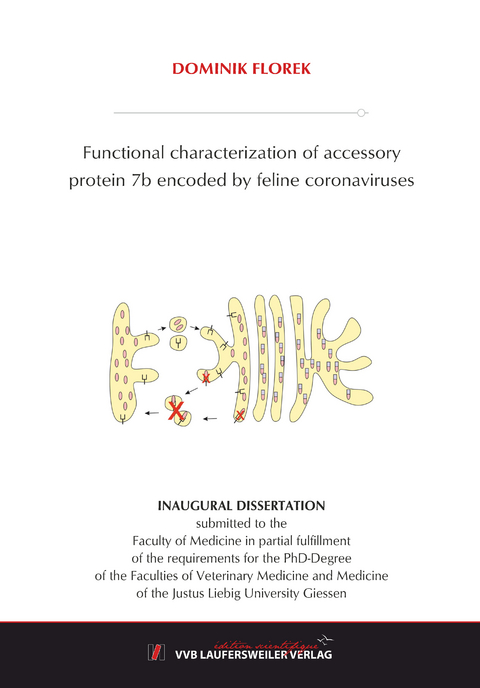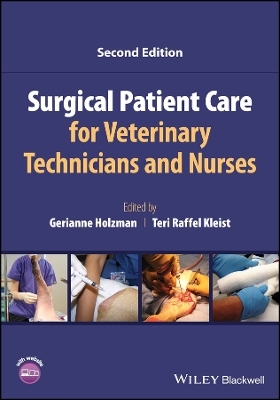
Functional characterization of accessory protein 7b encoded by feline coronaviruses
Seiten
2017
VVB Laufersweiler Verlag
978-3-8359-6631-4 (ISBN)
VVB Laufersweiler Verlag
978-3-8359-6631-4 (ISBN)
- Keine Verlagsinformationen verfügbar
- Artikel merken
Feline infectious peritonitis (FIP) is one of the most important lethal infectious diseases of cats. The genome of Feline infectious peritonitis virus (FIPV) contains five accessory genes: 3a, 3b, 3c, 7a and 7b. Due to the lack of proper immunological tools, so far, the characterization of putative FIPV accessory proteins was limited. In this study, expression, processing, glycosylation, subcellular localization and trafficking of the accessory protein 7b was studied for the first time in FIPV-infected cells. The following results were obtained:
1. Recombinant FIPV (rFIPV) expressing non-glycosylated form of 7b protein was generated using vaccinia virus-based reverse genetic system. Expression and subcellular localization of this protein in FIPV-infected cells was analyzed with Western blot and confocal microscopy using anti-7b monoclonal antibody (mAb). The data showed that the non-glycosylated form of 7b protein is not secreted but co-localizes with the Golgi apparatus.
2.To characterize the mature, glycosylated form of 7b protein, rFIPVs expressing flag-tagged 7b proteins were generated by reverse genetics. The flag tag was positioned downstream of the signalase cleavage site that was determined with N-terminal Edman sequencing. Expression and subcellular localization of the flag-tagged, mature form of 7b protein in FIPV-infected cells was investigated using Western blot and confocal microscopy with anti-flag mAb. Furthermore, the state of glycosylation of 7b protein was determined with Western blot after treatment with glycosidases. The obtained results indicated that the mature form of 7b protein is not secreted but retained in the medial/trans Golgi.
3.The C-terminal KTEL motif in 7b protein was altered to investigate its influence on the protein subcellular localization in FIPV-infected cells. Recombinant FIPVs expressing flag-tagged 7b protein with modifications in the C-terminal KTEL motif were generated using reverse genetics. Expression and subcellular localization of the 7b protein with altered C-terminal KTEL motifs in FIPV-infected cells was investigated with Western blot and confocal microscopy using anti-flag mAb. Additionally, the subcellular localization and trafficking of the 7b protein with altered C-terminal motifs was analyzed after inhibition of ongoing protein synthesis. It was shown that 7b protein only with an intact C-terminal KTEL motif was retained in the Golgi apparatus. KTEL to KDEL exchange led to ER retention of the protein, while KTEV, KTE and AAAA alterations abolished Golgi retention and led to efficient secretion of 7b protein.
The results of the current work provide important information on 7b protein and new insight into a Golgi retention signal that controls the trafficking of this protein in FIPV-infected cells. Further studies are required to elucidate the exact role of 7b in the coronaviral life cycle.
1. Recombinant FIPV (rFIPV) expressing non-glycosylated form of 7b protein was generated using vaccinia virus-based reverse genetic system. Expression and subcellular localization of this protein in FIPV-infected cells was analyzed with Western blot and confocal microscopy using anti-7b monoclonal antibody (mAb). The data showed that the non-glycosylated form of 7b protein is not secreted but co-localizes with the Golgi apparatus.
2.To characterize the mature, glycosylated form of 7b protein, rFIPVs expressing flag-tagged 7b proteins were generated by reverse genetics. The flag tag was positioned downstream of the signalase cleavage site that was determined with N-terminal Edman sequencing. Expression and subcellular localization of the flag-tagged, mature form of 7b protein in FIPV-infected cells was investigated using Western blot and confocal microscopy with anti-flag mAb. Furthermore, the state of glycosylation of 7b protein was determined with Western blot after treatment with glycosidases. The obtained results indicated that the mature form of 7b protein is not secreted but retained in the medial/trans Golgi.
3.The C-terminal KTEL motif in 7b protein was altered to investigate its influence on the protein subcellular localization in FIPV-infected cells. Recombinant FIPVs expressing flag-tagged 7b protein with modifications in the C-terminal KTEL motif were generated using reverse genetics. Expression and subcellular localization of the 7b protein with altered C-terminal KTEL motifs in FIPV-infected cells was investigated with Western blot and confocal microscopy using anti-flag mAb. Additionally, the subcellular localization and trafficking of the 7b protein with altered C-terminal motifs was analyzed after inhibition of ongoing protein synthesis. It was shown that 7b protein only with an intact C-terminal KTEL motif was retained in the Golgi apparatus. KTEL to KDEL exchange led to ER retention of the protein, while KTEV, KTE and AAAA alterations abolished Golgi retention and led to efficient secretion of 7b protein.
The results of the current work provide important information on 7b protein and new insight into a Golgi retention signal that controls the trafficking of this protein in FIPV-infected cells. Further studies are required to elucidate the exact role of 7b in the coronaviral life cycle.
| Erscheinungsdatum | 08.12.2017 |
|---|---|
| Reihe/Serie | Edition Scientifique |
| Sprache | englisch |
| Maße | 146 x 210 mm |
| Gewicht | 218 g |
| Themenwelt | Veterinärmedizin |
| Schlagworte | Doktorarbeit • Uni • Wissenschaft |
| ISBN-10 | 3-8359-6631-6 / 3835966316 |
| ISBN-13 | 978-3-8359-6631-4 / 9783835966314 |
| Zustand | Neuware |
| Informationen gemäß Produktsicherheitsverordnung (GPSR) | |
| Haben Sie eine Frage zum Produkt? |
Mehr entdecken
aus dem Bereich
aus dem Bereich
A Practical Guide
Buch | Hardcover (2024)
Wiley-Blackwell (Verlag)
CHF 204,30
Buch | Hardcover (2024)
Wiley-Blackwell (Verlag)
CHF 174,35
Buch | Softcover (2024)
Wiley-Blackwell (Verlag)
CHF 133,15


